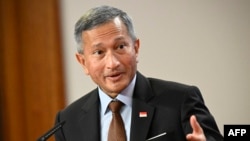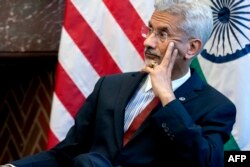Two-day talks between India and the Association of Southeast Asian Nations (ASEAN) foreign ministers opened Thursday in New Delhi with calls for stronger ties between India and the regional bloc.
The talks come amid a heightened rivalry between China and the United States, which Singapore said threatens peace in the region.
India and Singapore, the event co-chair, also underscored geopolitical challenges sparked by the war in Ukraine.
In his opening remarks to the 10-member group of Southeast Asian foreign ministers, Singapore Foreign Minister Vivian Balakrishnan said Russia’s invasion of Ukraine “upended the international system of rules and norms.” He also said the “sharpening superpower rivalry” between China and the U.S. has direct implications for all of Asia.
“So, these developments, if unchecked, can threaten the sole system of peace and stability which we have depended on for the basis of our growth, our development and prosperity over many decades," Balakrishnan said, marking the 30th anniversary of relations between New Delhi and ASEAN.
In discussing the challenges, Indian Foreign Minister Subrahmanyam Jaishankar said the “developments in Ukraine” and their effects on food and energy security, fertilizer and commodities prices, and logistics and supply chain disruptions had made the task of recovery from the pandemic more arduous.
He said the role of ASEAN would be critical given the new geopolitical challenges and emphasized the need to improve land and sea connectivity between India and ASEAN countries.
“A better-connected India and ASEAN would be well-positioned to promote decentralized globalization and reliable supply chains,” Jaishankar said. “India fully supports a strong, unified, prosperous ASEAN whose centrality in the Indo-Pacific is fully realized.”
The foreign ministers also met with Indian Prime Minister Narendra Modi.
ASEAN comprises Brunei, Cambodia, Indonesia, Laos, Malaysia, Myanmar, the Philippines, Singapore, Thailand and Vietnam.
Strengthening strategic, political and economic ties with ASEAN has become a priority for India and the U.S. as both countries seek to push back against growing Chinese influence in the Indo-Pacific region.
Last month, U.S. President Joe Biden held a first summit with ASEAN leaders in Washington and said it marked the launch of a “new era” in ties between Washington and the bloc.
Several ASEAN countries have maritime disputes with Beijing, which has built islands in waters claimed by several countries in East Asia, raising worries about Chinese expansionism in the region.
Analysts, however, say with China remaining the primary trading partner for ASEAN nations, the bloc will be careful to balance ties between both sides. Despite efforts, trade between ASEAN and India has remained modest — up to $78 billion in 2021.





